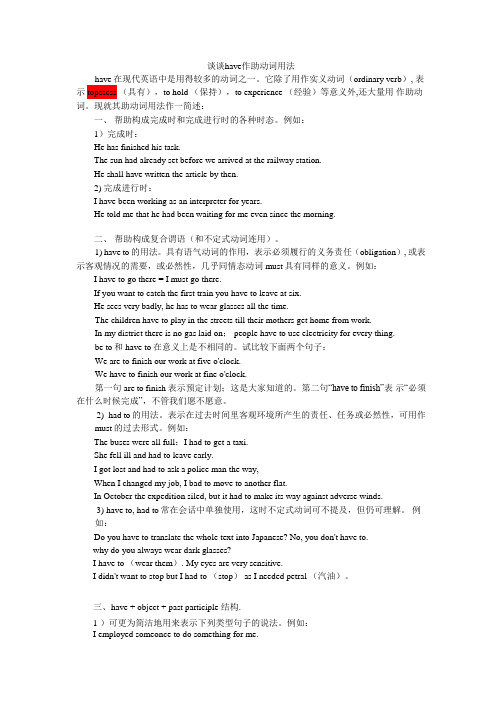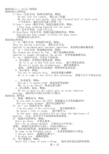助动词have用法
- 格式:doc
- 大小:24.00 KB
- 文档页数:2

谈谈have作助动词用法have在现代英语中是用得较多的动词之一。
它除了用作实义动词(ordinary verb), 表示topssess (具有),to hold (保持),to experience (经验)等意义外,还大量用作助动词。
现就其助动词用法作一简述:一、帮助构成完成时和完成进行时的各种时态。
例如:1)完成时:He has finished his task.The sun had already set before we arrived at the railway station.He shall have written the article by then.2) 完成进行时:I have been working as an interpreter for years.He told me that he had been waiting for me even since the morning.二、帮助构成复合谓语(和不定式动词连用)。
1) have to的用法。
具有语气动词的作用,表示必须履行的义务责任(obligation), 或表示客观情况的需要,或必然性,几乎同情态动词must具有同样的意义。
例如:I have to go there = I must go there.If you want to catch the first train you have to leave at six.He sees very badly, he has to wear glasses all the time.The children have to play in the streets till their mothers get home from work.In my district there is no gas laid on; people have to use electricity for every thing.be to和have to在意义上是不相同的。


have原形,用于第一人称(I, we),第二人称(you),及第三人称复数(they)或者复数名词;has是have的第三人称单数形式(he, she, it)或单数名词,或不可数名词做主语;having 是have的现在分词;had是have的过去式;过去分词。
一、have用作实义动词。
1. have 用作“有”表示拥有的意思。
如:I have an apple and he has two bananas. 我有一个苹果,他有两个香蕉。
You have a new English teacher. 你们有了一个新的英语老师。
It has two big eyes. 它有一双大眼睛。
2.have 有“吃、喝”的含义。
如:have breakfast 吃早饭have lunch 吃午饭have supper 吃晚饭have dinner 吃正餐have a meal 吃一顿饭例句:I often have milk and eggs for breakfast.我早饭经常喝牛奶吃鸡蛋。
Do you usually have tea in the afternoon?你通常下午喝茶吗?What do you often have for your three meals?你的一日三餐通常吃什么?3.have 用来描述病情。
如:have a cold 感冒have a toothache牙痛have a fever发烧have a sore back背痛例句:“What’s the matter?”你怎么了?“I have a toothache.”我牙疼。
4. have to 不得不,与must意思相同。
如:I have to tidy my room.我不得不整理房间。
She has to help with the washing.她得帮忙洗衣服。
You don't have to go if you don't want to.如果你不想去,你就不必去。

助动词have \ be\do 的用法助动词have的用法1)have +过去分词,构成完成时态,例如:He has left for London. 他已去了伦敦。
By the end of last month, they had finished half of their work.上月末为止,他们已经完成工作的一半。
2)have + been +现在分词,构成完成进行时,例如:I have been studying English for ten years.我一直在学英语,已达十年之久。
3)have+been +过去分词,构成完成式被动语态,例如:English has been taught in China for many years.中国教英语已经多年。
助动词be的用法1) be +现在分词,构成进行时态,例如:They are having a meeting. 他们正在开会。
English is becoming more and more important. 英语现在越来越重要。
2) be + 过去分词,构成被动语态,例如:The window was broken by Tom.. 窗户是汤姆打碎的。
English is taught throughout the world. 世界各地都教英语。
3) be + 动词不定式,可表示下列内容:a. 表示最近、未来的计划或安排,例如:He is to go to New York next week.. 他下周要去纽约。
We are to teach the freshpersons. 我们要教新生。
说明:这种用法也可以说成是一种将来时态表达法。
b. 表示命令,例如:You are to explain this. 对此你要做出解释。
He is to come to the office this afternoon. 要他今天下午来办公室。

万能词have的用法一、have的基本含义和用法1.1 have作为动词意味着“拥有”或“具备”•表示物品的所有权,例如:–I have a car.(我有一辆车。
)–She has three cats.(她有三只猫。
)•表示人们所具备的特质或能力,例如:–He has a great sense of humor.(他有很强的幽默感。
)–They have a lot of experience in this field.(他们在这个领域有很多经验。
)1.2 have用作情感或感觉的动词•表示经历或感受到某种情感或感觉,例如:–I have a headache.(我头疼。
)–She has a feeling of frustration.(她有种挫败感。
)二、have的其他用法2.1 have作为助动词•表示完成时态,例如:–They have gone to the cinema.(他们去电影院了。
)–He has finished his homework.(他完成了作业。
)2.2 have作为帮助构成某些动词短语•have + to + 动词原形,表示义务或必要性,例如:–I have to study for the exam.(我得为考试学习。
)–She has to finish the report by tomorrow.(她必须在明天之前完成报告。
)•have + 动词的过去分词,表示完成或被动的意义,例如:–We have finished our project.(我们完成了我们的项目。
)–The book has been read by many people.(这本书已经被很多人读过。
)2.3 have用作动词与介词的搭配•have + 宾语 + 介词短语,表示拥有或进行某种行为,例如:–He has a cup of coffee in the morning.(他早上喝一杯咖啡。

have⽤法⼩结 have是⽤以构成完成式及完成式的不定式,表⽰已经…have⽤法⼩结有哪些呢?本⽂是店铺整理have⽤法⼩结的资料,仅供参考。
have⽤法⼩结 ⼀、have作实意动词. 1.表⽰“有”的意思. Look,I have wings,just like you. He had fair hair and blue eyes. 〔注1〕:其否定和疑问形式变化,在美国通常⽤助动词do. 〔注2〕:在英国⼝语中常⽤have got代替have. Look,can’t you see I've got teeth,too. I haven't got any jewelry. 2.have和⼀些其他名词连⽤,表⽰: (1)⼀种活动. We have no classes on Sunday.(上课) they’re going to have a volleyball match.(举⾏⽐赛) Are we going to have a meeting this week?(开会) We are going to have a talk this afternoon.(听报告) (2)患病. I have got a headache. I have a bad cold. (3)发⽣的情况. I've had so many falls that I'm black and blue all over.(跌跤)(JBⅣL10) (4)⽣育. The queen ant may have tens of thousands of babies in one summer. 3.和⼀与动词同形的名词连⽤,表⽰⼀个动作(have+a+由动词转化和名词). Are you going to have a swim. I have a long talk with the teacher. 4.have on sth.或have sth.on,表⽰“穿着”、“戴着”(=to be wearing). I noticed he had on bedroom slippers. At the ball Motile had a diamond necklace on. 5.表⽰“吃”、“喝”. I wanted to have a cup of tea and some eggs. Does she have lunch at home? 6.组成复合结构即“have+宾语+宾语补⾜语”. (1)不加to的动词不定式作宾语补⾜语(have sb.do sth.),表⽰让、叫某⼈做某事. The soldier had him stand with his back to his father. 〔注〕:否定结构表⽰“不能让…”或“从未有⼈…”. We won't have you blame it on others. She had never had anybody speak to her that way before. (2)现在分词作宾语补⾜语(have sb.(sth.)doing),表⽰让(使)某⼈做某事. …the two men had their lights burning all night long…. (3)过去分词作宾语补⾜语(have sb.(sth.)done),表⽰: ①使(让,请)别⼈作某事,表⽰的动作是别⼈做的. Emperor Qin Shi Huang had all the walls joined up. …he should have new clothes made of this splendid cloth for the coming great procession. ②遭遇到某事. Houses near airports sometimes have their windows broken. Workers in some industries have their hearing harmed by the noise of the machine. ⼆、have与to⼀起构成情态动词,表⽰“不得不”、“必 须”,可⽤于各种时态. I have to look after her at home. 三、have做助动词与动词的过去分词⼀起构成现在完成时 和过去完成时. Great changes have taken place the last two years. They said that the Arab had stolen their camel. 四、have⽤于“情态动词+have+过去分词”的结构,有推测、假设之意. 1.must+have+过去分词,表⽰对过去时间发⽣的动作或存在的情况的推测,⼀般⽤于肯定句. Her father thought that she must have met a fairy. You must have left your bag in the theatre. 2.can(could)+have+过去分词,表⽰对过去发⽣事情的“不肯定”,常⽤于否定句和疑问句. He can't have been to your home,he doesn't know your address. 3.should+have+过去分词,表⽰“某事本该早做⽽实际未做”,⽤于肯定句. You should have been here five minutes ago. 五、have⽤于某些成语,表⽰固定的意思. 1.have a word(a few words)with sb.,表⽰和某⼈说⼀(⼏)句话. Where's Peter?I want to have a word with him. 2.had better+不带to的动词不定式,表⽰“…最好…”. I'd better go and look for him now. 3.have nothing(something)to do with,表⽰“和…⽆(有)”关系. Most of questions had nothing to do with Edison's lessons. 动词have的⽤法 动词have在中学英语中的⽤法 ⼀、have作实意动词。
助动词have \ be\do 的用法助动词have的用法1)have +过去分词,构成完成时态,例如:He has left for London. 他已去了伦敦。
By the end of last month, they had finished half of their work.上月末为止,他们已经完成工作的一半。
2)have + been +现在分词,构成完成进行时,例如:I have been studying English for ten years.我一直在学英语,已达十年之久。
3)have+been +过去分词,构成完成式被动语态,例如:English has been taught in China for many years.中国教英语已经多年。
助动词be的用法1) be +现在分词,构成进行时态,例如:They are having a meeting. 他们正在开会。
English is becoming more and more important. 英语现在越来越重要。
2) be + 过去分词,构成被动语态,例如:The window was broken by Tom.. 窗户是汤姆打碎的。
English is taught throughout the world. 世界各地都教英语。
3) be + 动词不定式,可表示下列内容:a. 表示最近、未来的计划或安排,例如:He is to go to New York next week.. 他下周要去纽约。
We are to teach the freshpersons. 我们要教新生。
说明:这种用法也可以说成是一种将来时态表达法。
b. 表示命令,例如:You are to explain this. 对此你要做出解释。
He is to come to the office this afternoon. 要他今天下午来办公室。
常用英语动词Have的几种用法Have的用法详解:含义、用法及实践案例在英语中,动词have是一个十分常用的词,它既可以作为实义动词,表示拥有、具有的意思,也可以作为助动词,构成各种时态的动词形式。
下面我们将对have的用法进行详细解析,并通过实践案例来加深理解。
一、have作为实义动词的用法1.表示拥有、具有当have表示拥有或具有某种属性或物品时,可以与名词、形容词、介词短语等搭配使用。
例如:I have a car.(我有一辆车。
)She has a beautiful garden.(她有一个美丽的花园。
)2.表示发生、进行have还可以表示某种事情的发生或进行,如:It has rained since morning.(自从早上就开始下雨了。
)They have been to China twice.(他们已经来过中国两次了。
)二、have作为助动词的用法1.构成完成时态have作为助动词,常与主语和动词原形搭配,表示动作的完成。
如:I have eaten breakfast.(我已经吃过了早餐。
)She has finished her homework.(她已经完成了作业。
)2.构成完成进行时态have也可以与主语和动词的现在分词形式搭配,表示动作的完成和进行。
如:I have been studying English.(我一直都在学习英语。
)She has got used to living in the city.(她已经适应了城市生活。
)3.与其他助动词搭配使用have还可以与其他助动词如had、have、had been等搭配,构成各种时态的疑问句和否定句。
如:Have you finished your work?(你完成工作了吗?)She hasn't arrived yet.(她还没到。
)实践案例:下面我们通过一些实际例句来巩固have的用法:1. I have lost my keys.(我丢失了钥匙。
have作助动词的用法
"have" 作为助动词有以下几种常见的用法:
1. 表示完成时态:在完成时态中,have 作为助动词,后面跟过去分词。
例如:
- She has finished her work.(她已经完成了工作。
)
- I have seen this movie before.(我之前看过这部电影。
)
2. 表示情态动词:have 可以用于表示情态动词,表示别人应该、可能或者不应该做什么。
例如:
- You have to be punctual.(你必须准时。
)
- You shouldn't have done that.(你不应该那样做。
)
- I have to go to the dentist tomorrow.(我明天必须去看牙医。
)
3. 表示另外一件事情的发生:have 可以用于表达某件事情发生在另外一件事情之前或者同时发生。
例如:
- I had just finished my homework when the phone rang.(我刚做完作业,电话铃响了。
)
- She was having breakfast when I arrived.(我到达时她正在吃早餐。
)
需要注意的是,have 作为助动词还有其他的一些用法,这些用法在不同的语境下表达的意思也会有所不同。
助动词have用法
这篇关于助动词have用法,是笔者特地为大家整理的,希望对大家有所帮助!
助动词have以及它的变体has, had等的主要用法如下:
1. have +过去分词,构成完成时态。
如:
He has left for Japan. 他已去了日本。
We’ve just done the washing-up. 我们刚洗完碗碟。
Poor Jim has just had an accident. 可怜的吉姆刚出了个事故。
I have had this car for three years. 这辆汽车我已用了3年了。
By the end of last month, they had finished the work. 上月未他们就已经完成了工作。
2. have + been +现在分词,构成完成进行时。
如:
I have been studying English for 8 years. 我学英语已达八年了。
The children have been having a lot of run. 孩
子们一直玩得很开心。
We had been doing business with each other for years before we quarreled. 在吵翻之前,我们多年来在业务上一直来往。
By this time next year, we will have been doing business with each other for 20 years. 到明年这时候,我们的业务住来就满20年了。
I woke up—I had been having a bad dream. 我醒了,我做了个噩梦。
3. have+been +过去分词,构成完成式被动语态。
如:
English has been taught in China for many years. 中国教英语已经多年。
I have been made redundant, so I’m going abroad. 我被定成了超编人员,所以我打算出国。
Thousands of pounds have been spent on the new hospital. 这家新医院花费了数千英镑。
None of my friends have been invited to the party. 我的朋友中没有一个被邀参加晚会。
All means have been used to get him to change his mind. 为了转变他的想法,所有的办法都用过了。